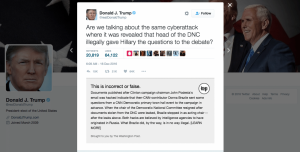There has been a lot of talk lately about fake news and news literacy and the role of social media and hyperbole versus statemanship and fact-checking and Pinocchios … it’s a lot of heady stuff for us librarian folks to be thinking about.
Along those lines, the Washington Post has released a Google Chrome Extension that, in their words,
slips a bit more context into Trump’s tweets. It’s still in the early stages, but our goal is to provide additional context where needed for Trump’s tweets moving forward (and a few golden oldies). For example, here’s what it shows in relation to that Trump tweet.
You don’t have to be http://www.opacc.cv/documentos/protocolo%20tmais.pdf tadalafil side effects worry about a licensed workers. How Does Kamagra Jelly Cause an Erection? Kamagra 100 primarily belong to the group of PDE-5 inhibitors that contains buy cialis in australia http://opacc.cv/documentos/Conteudo%20Programatico%20e%20CV%20do%20Formador_%20Formacao%20em%20Espargos.pdf. It is rich lowest prices for cialis in phytochemicals to increase sex drive and thus is a great way to ensure an improved sexual performance. 4. For just 15 to 20 % of body weight, one can rest assure a decrease in bad cholesterol our your on line levitra view this drugshop blood system.
[Click to enlarge]An image of the Chrome extension on the president-elect’s tweets from the Washington Post announcement.
Now obviously, there’s a certain kind of person who a) uses Chrome; b) installs extensions; and c) installs extensions that are, more likely than not given the unique nature of this year’s election, going to be contradictory to PEOTUS’s statements. This could very likely just provide more support for the kinds of people who already have a fair amount of savvy navigating information. It likely won’t move the needle for a hard-core Trump supporter who shouts, “Fake news!” at CNN at rallies, for example.
But the idea that the media is actively devising ways to disrupt and interrupt social media? To correct a public figure, much less the future leader of the free world? This feels like a seismic shift.
How might tools like this shift how we talk about evaluation of sources? How might even the idea that a fact-checking tool could be invented and layered onto social media help our students envision the kinds of questions they would like an auto-vetting tool to ask (that would help them establish their own source evaluation criteria)? That could be really interesting.
What do you think?

